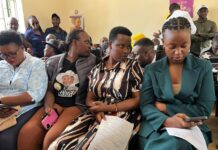By URN
Refugee women entrepreneurs in Uganda have called for the incorporation of Islamic banking in the Generating Growth Opportunities and Productivity for Women Enterprises (GROW) project. They say doing so would make the program more inclusive and respectful of their religious beliefs, especially regarding interest-free financing.
The GROW project is a World Bank initiative supported by the Private Sector Foundation Uganda (PSFU). The over USD 217 million project seeks to support women entrepreneurs across the country by helping them access training, business advice, and affordable loans to expand their businesses and improve their livelihoods.
But many refugee women say they have not been able to benefit from the program, particularly the loan facility, because it does not offer Islamic-compliant financing, which avoids charging interest, something forbidden (haram) in Islam.
“I want to grow my business, but I can’t borrow money that has interest,” says Mariam Ndayiziye, a Burundian refugee who has lived in Uganda for five years and runs a restaurant in Kawempe, a suburb of Kampala. “It is against my faith.”
Ndayiziye said she started her business with support from GiveDirectly, a cash transfer NGO, but now needs more capital to stay afloat. Unfortunately, she says, many of her customers take food on credit and don’t pay back on time, making it hard to keep the business going. “If GROW offered Islamic loans, I would take the money immediately. I came here hoping for support, but I found that interest-based loans are the only option,” she explained.
So far, according to officials from the GROW Secretariat, only five refugee women entrepreneurs have been able to access the project’s loan facility since it was rolled out in 2024.
During a basic business skills training session for urban refugee women in Kampala, participants raised several concerns, including language barriers and the fact that many available loans charge interest, which discourages Muslim women from applying.
Aliyah Abdulgadil, a Sudanese refugee who operates an online gift shop, says she also needs financing to grow her business, but cannot take loans that involve interest. “Almost all my profits go into delivery costs,” she said. “If I could get interest-free support, I would invest in improving the service and buying stock in bulk. But I can’t take haram money.”
The GROW project was launched by the Ministry of Gender, Labour and Social Development, in partnership with PSFU and other development partners. It is funded by the World Bank and aims to support over 60,000 women entrepreneurs in Uganda, of which 3,000 must be refugee women-owned.
Speaking at the training, Dr. Diana Nandagire Ntamu, a senior lecturer and Director of the Entrepreneurship and Innovation Centre at Makerere University Business School, emphasised that the GROW project is designed to help women build skills and access opportunities that can transform their lives. “Women are the backbone of many small and micro businesses in Uganda,” she said. “But they are often stuck in sectors that are less profitable and face barriers like limited access to finance, business skills, and networks.”
Dr. Ntamu added that empowering women, especially refugee women, creates a ripple effect. “When you support a woman, you support an entire family and community. That’s why we are targeting them.”
She acknowledged the concerns raised by Muslim refugee women and noted that the message will be passed on to the relevant authorities. She revealed that efforts are underway to expand the training program to refugee settlements in northern Uganda. “The team is waiting for guidance from the Ministry on where to go next, she said.
Islamic banking follows Sharia (Islamic law), which prohibits charging interest (riba) on loans. Instead, financial institutions offer interest-free alternatives such as Profit-sharing arrangements, Lease-to-own models, and service charges instead of interest.
In many countries, Islamic banking has become a way to include more Muslims in the formal financial system without forcing them to compromise their beliefs. Refugee women in Uganda are asking for the same consideration. “We don’t want to be left out just because of our religion,” said Aliyah. “Give us options that match our faith, and we will grow our businesses too.”


